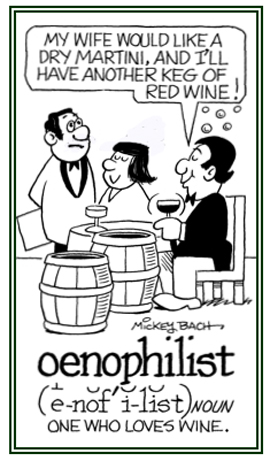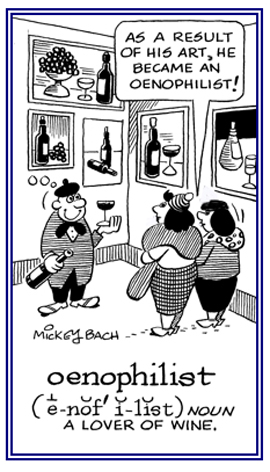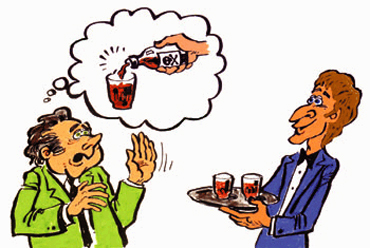oeno-, oen-, eno-, oino-, oin-
(Greek: wine, fermented grape juice)
oenophilic, enophilic (ee" nuh FIL ik) (adjective); more oenophilic, more enophilic; most oenophilic, most enophilic
A reference to a person who enjoys wines; usually, as a connoisseur or an aficionado who is very knowledgeable and enthusiastic about the finest wines: Tom’s father was the most oenophilic person at his country club and made many presentations about the history and current locations of the best vineyards in the world.
Someone who loves wine or who knows a great deal about it: Greg completed his training to be a oenophilist and received his sommelier (chef de cuisine) certificate. Now he is able to recommend vintages to the patrons in the dining room of the 5-star hotel.

© ALL rights are reserved.

© ALL rights are reserved.
Go to this Word A Day Revisited Index


Go to this Word A Day Revisited Index
so you can see more of Mickey Bach's cartoons.
A condition that involves a fondness for collecting and drinking various kinds of wine: Mary’s next-door neighbor is known for her oenophily because she often attends trade shows exhibiting grape beverages from around the world.
The state or condition of being drunk from wine: The porter at the hotel recognized that Anne was suffering from oenophlygia and so he ordered a taxi to take her home safely.
Someone who has a dread of drinking too much wine or has a strong negative feeling about drinking anything that is alcoholic: Herald was an oenophobist who avoided going to parties, social gatherings, and local pubs where fermented beverages were served because he didn’t want to observe other people who were making fools of themselves.


oenopoetic (ee" noh poh ET ik) (adjective), more oenopoetic , most oenopoetic
A reference to or relating the production of wine: The greatest oenopoetic nations are said to be France, Italy, Spain, Argentina, Portugal, Germany, and Algeria.
Germany, in its Rhine and Moselle wines, has been known to provide oenopoetic qualities for the pleasure of its consumers.
The use of wine for purposes of treating a physical or a mental ailment: One of the major components of oenotherapy is the consumption of fermented beverages made of grapes in moderation on a regular and daily basis and not just for special occasions, celebrations, or for fancy dinners.
People should avoid drinking any alcoholic beverage, if they react badly to it and if they have:
- Any significant stomach disease; such as, gastritis or ulcers.
- A liver disease; such as, hepatitis or cirrhosis.
- A heart disease; such as, myocarditis or myocardopathy.
- A nerve disease; such as, peripheral neuropathy or encephalopathy.
Fortune telling with wine: Oinomancy dates from ancient Greece and Rome, when wine was poured as a libation, or an offering, to the gods in hopes that they would ensure a prosperous future for the worshippers.
Now, a modern survival of oinomancy is demonstrated when people drink wine to the health of others.
An outrageous and extreme dislike of wine: In the early years of the 20th century, many organizations and individuals exhibited fanatical oinophobia to the point of smashing windows in bars, causing wagons transporting beverages to overturn in streets and spilling their contents, as well as often injuring the horses and drivers.
Showing page 2 out of 2 pages of 24 main-word entries or main-word-entry groups.

